Mission, Vision, and History
Mission
Chinese for Affirmative Action (CAA) was founded in 1969 to protect the civil and political rights of Chinese Americans and to advance multiracial democracy in the United States. Today, CAA is a progressive voice in and on behalf of the broader Asian American and Pacific Islander community. We advocate for systemic change that protects immigrant rights, promotes language diversity, and remedies racial and social injustice.
Vision
Our founding vision in 1969 that endures today is of a world that works for everyone. A world in which all people live free from bigotry, discrimination, hate, and prejudice. Core civil rights values such as inclusion, compassion, and equity guide the change we seek and the convictions we embody.
Over the past five decades, we have made tremendous progress. Yet in 2025, our nation stands at a crossroads—between retreating into retrenchment, where the rights and well-being of historically disenfranchised, marginalized, and vulnerable communities are once again denied and dismantled, or recommitting to the principles of justice and equality. In the face of this choice, CAA chooses the path forward: we will defend hard-won rights, stand with our communities, and safeguard our democracy for generations to come.
History
Founded in 1969 by a group of young activists, CAA has a proud history of achieving social change.
For five decades CAA has challenged systemic discrimination to advance civil rights and equality, created coalitions that bridge traditional boundaries, and prioritized the needs of our community’s most marginalized members.
Some of our historic accomplishments include preparing the landmark U.S. Supreme Court case Lau v. Nichols, protesting the brutal hate crime murder of Vincent Chin, combating the racial profiling and incarceration of Dr. Wen Ho Lee, winning groundbreaking local and state immigrant rights legislation, and successfully campaigning for the permanent Chinatown campus for City College of San Francisco.
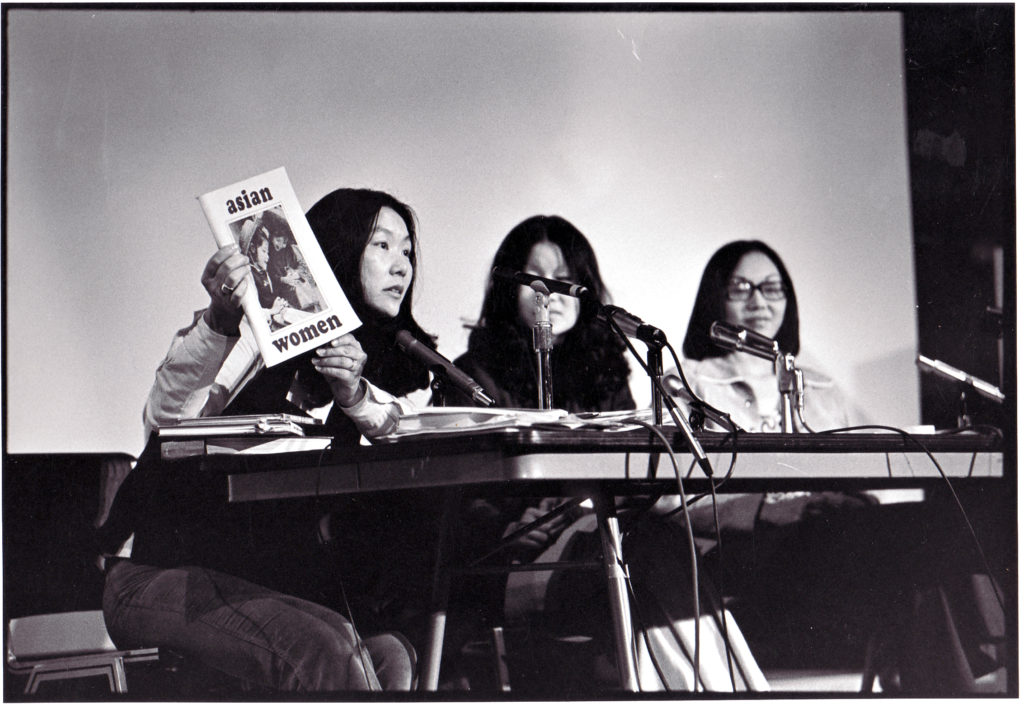
What CAA Has Achieved
1969 to 1979
Community activists and students establish Chinese for Affirmative Action to advocate on behalf of Chinese Americans who are systematically denied equal opportunities in many sectors of society.
CAA assists in preparing the landmark US Supreme Court case Lau v. Nichols, which results in bilingual education provisions for growing numbers of Chinese- and Spanish-speaking public school students in San Francisco.
CAA successfully demands bilingual election ballots in San Francisco to comply with new state election code mandating bilingual assistance where a significant need is identified.
CAA joins Officers for Justice and other minority and women groups to challenge discriminatory hiring and promotional practices of the San Francisco Police Department. The lawsuit leads to a dramatic increase in API police officers.
CAA files a complaint against the largest HMO in Northern California for failing to provide equal access and services to Chinese-speaking patients. The settlement reached through the federal government becomes a model for other bilingual health access programs.
CAA mounts a national campaign to oppose clustering all Asian Americans and Pacific Islanders in one racial category in the 1980 Census questionnaire. The Census ultimately lists nine distinct API groups.
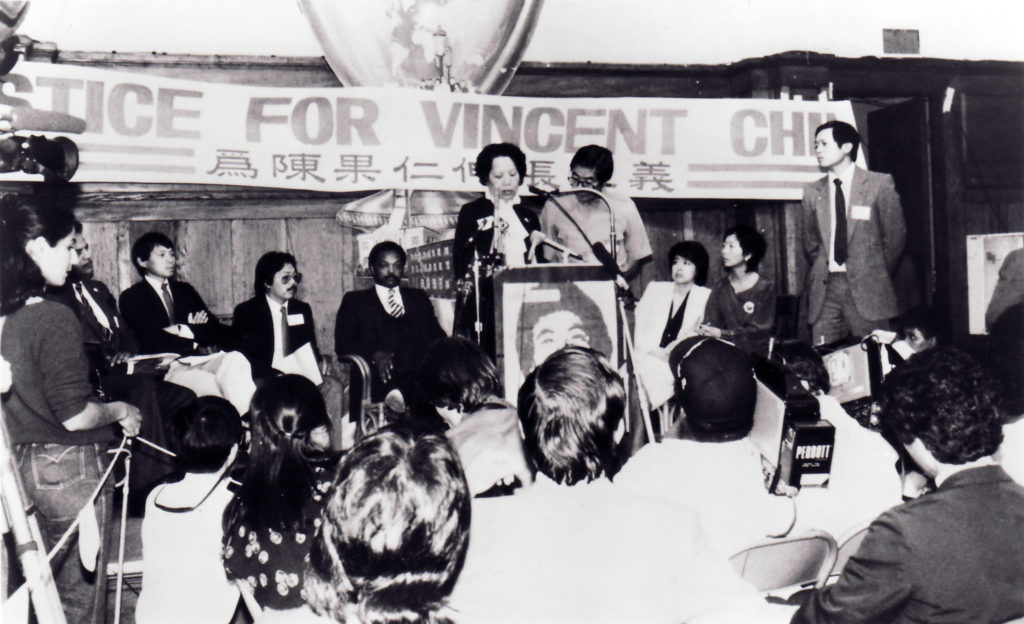
1980 to 1989
CAA continues leading-edge work to win and ensure Asian American representation in news media in print journalism, radio, and television.
CAA co-produces award-winning radio and television series including Practical English and Bean Sprouts with pioneering filmmaker Loni Ding.
CAA joins a nationwide coalition to protest the brutal murder of Vincent Chin and initiates a campaign with the US Department of Justice urging prosecution of the two men involved in the killing. The case is appealed and retried.
The first of a series of Broken Ladder reports, analyzing the lack of API representation in management and promotional opportunities in San Francisco civil service, is published.
CAA intervenes in the lawsuit against the San Francisco Fire Department to address the under-representation of APIs in the department.
CAA joins nation-wide efforts to stop the regressive Kennedy-Simpson immigration bill, which would have substantially reduced visas and given preference to independent immigrants with English-speaking skills.
The second Broken Ladder report, analyzing Asian Americans in city government, is published.
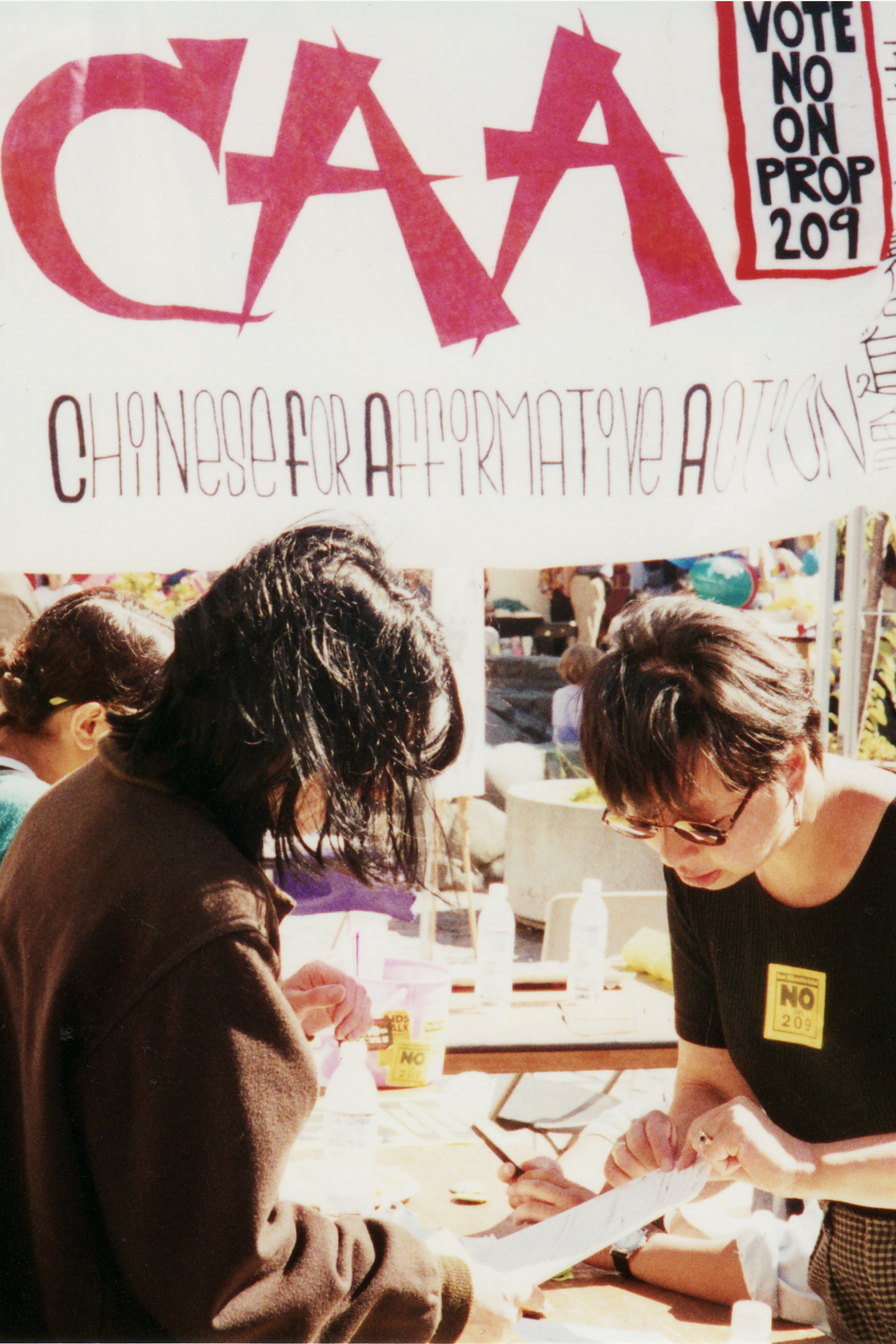
1990 to 2005
CAA and Latino groups work to intervene in the desegregation lawsuit against the San Francisco Unified School District in order to improve services for educationally disadvantaged minority students, especially low-income and immigrant students.
CAA convinces SFUSD to transform Galileo High School into a magnet Galileo Academy of Science and Technology, benefiting its primarily low-income, minority, immigrant, and limited-English proficient students.
CAA plays a lead role in coordinating opposition to California Proposition 209, the anti-affirmative action initiative, and Proposition 227’s attack on bilingual education.
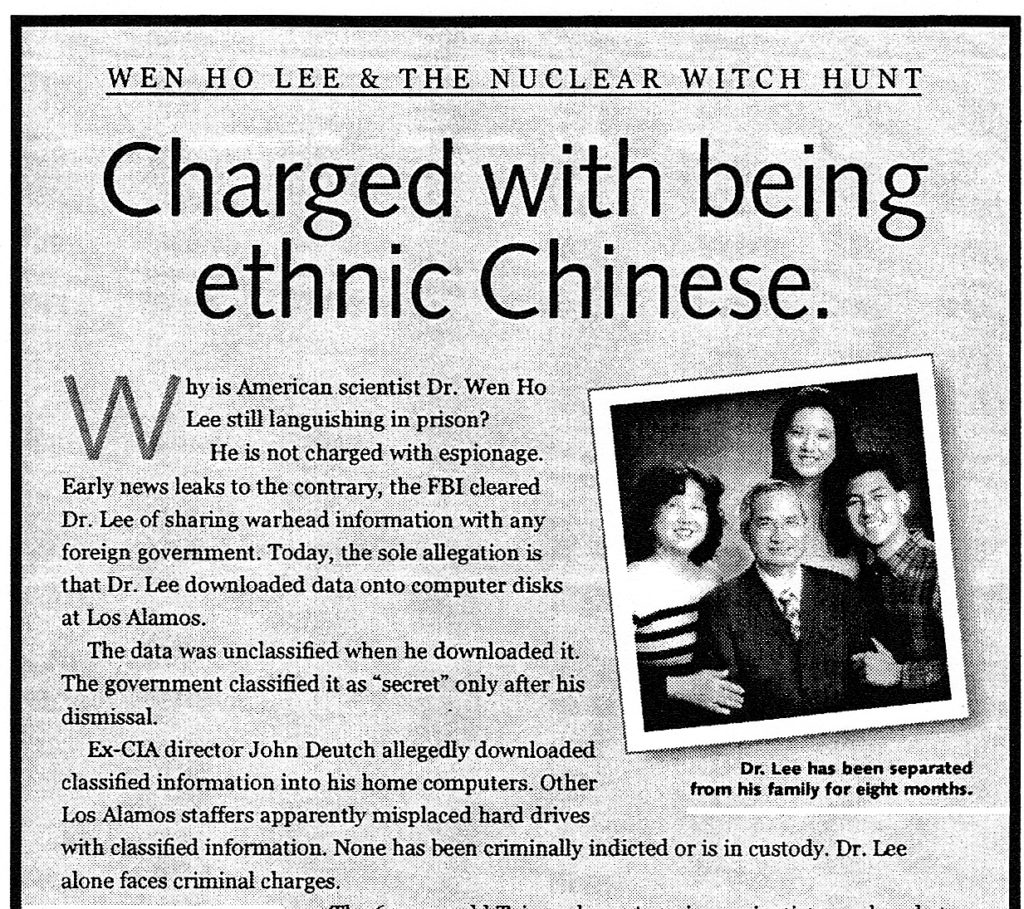
CAA develops programs to help local businesses and workers overcome the barriers created by 209.
CAA successfully advocates for millions of dollars in state and local funds to support Census 2000 ethnic media coverage and community outreach, aimed at improving the count of usually dramatically under-enumerated APAs and other hard-to-count communities.
CAA combats the racial profiling and incarceration of Dr. Wen Ho Lee through national organizing, supporting legal actions, and media advocacy, including purchase of a full-page ad in the New York Times entitled “Charged with being ethnic Chinese.”
CAA successfully advocates for the passage of the Equal Access to Services Ordinance in San Francisco, requiring key City agencies to provide services to limited-English proficient communities.
A study published by CAA finds a 22% decrease in total dollars awarded to minority/women-owned businesses in seven government agencies after passage of Proposition 209, resulting in a loss of almost $100 million dollars annually to these businesses.
CAA opens the first statewide policy office for Asian Americans based in Sacramento on issues such as language access, voting rights, equal opportunity, and educational equity, and produces the first Asian and Pacific American Legislative Report Card, reporting on how California state legislators voted on priority issues for Asian and Pacific Americans.
CAA teams up with grassroots API organizations around the state to defeat Proposition 54, which would have banned state and local governments from gathering race and ethnicity data.
CAA launches the Visitacion Valley Parents Association, a community organizing project for limited-English proficient Chinese Americans in Visitacion Valley, focused on parent leadership development to improve public education.
CAA releases The Language of Business: Adopting Private Sector Practices to Increase Limited- English Proficient Individuals’ Access to Government Services.
No Parents Left Behind, a CAA report recommending public school improvements in the translation of important written communications into languages parents can understand, leads to new allocations to the California Department of Education to increase resources for translation.
CAA joins with allies to co-sponsor and win passage of the California Hate Crime Civil Remedies Act.
To meet the needs of the mass dislocation of garment workers in Chinatown, CAA partners with community groups to expand vocational training and job placement services.
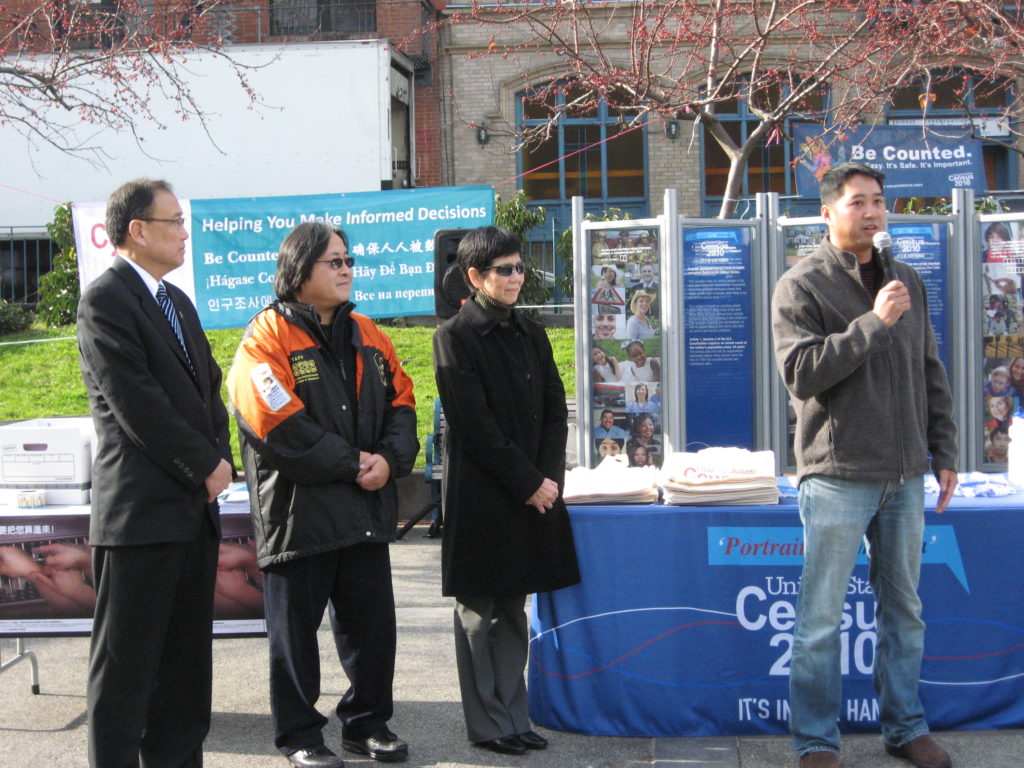
CAA Co-Executive Director Vincent Pan gives remarks at a 2010 Yes We Count! U.S. Census event in San Francisco Chinatown’s Portsmouth Square.
2006 to 2016
CAA publishes Lost Without Translation, a survey report on language barriers faced by LEP parents with children in the San Francisco Unified School District.
CAA successfully advocates for an Office of Language Services in San Francisco, doubles the funding available to support LEP public school parents in San Francisco, and secures funding for a neighborhood workforce center in Chinatown.
CAA leads over 100 community groups in the historic community mobilization to win approval for a permanent City College Campus in San Francisco Chinatown to provide generations of immigrant students with equal access to educational opportunities.
To improve public safety and protect immigrants rights, CAA and allies successfully advocate for a San Francisco Police Department General Order on police interactions with LEP residents.
CAA publishes Access Deferred: Progress, Challenges and Opportunities, which surveys the experiences of limited-English proficient Chinese- and Spanish-speaking residents when they interact with San Francisco City agencies. Findings from the report help convince San Francisco Supervisors and the Mayor to adopt stronger language access laws in the City.
CAA convinces the U.S. Census Bureau to reverse a harmful policy that would have limited communication between Census and U.S. residents to English-only. Through CAA’s efforts, the Census agrees to mail the notification letters in English, Spanish, Chinese, Korean, Vietnamese, and Russian.
CAA leads the San Francisco Yes We Count Coalition, a historic multiracial and multicultural collaborative of grassroots organizations, to conduct canvassing in support of the 2010 Census. As a result of the Yes We Count’s work, traditionally undercounted San Francisco neighborhoods achieve major gains in Census participation compared to 2000.
CAA releases The Failure of Good Faith, a report that studies and makes recommendations to reform hiring procedures on San Francisco-funded construction projects. Based on the report, CAA mobilizes to help pass one of the strongest mandatory local hiring ordinances in the country.
CAA provides critical leadership to address neighborhood safety issues in diverse communities, and helps garner resources and attention to the unique public safety communication needs in and between communities of color.
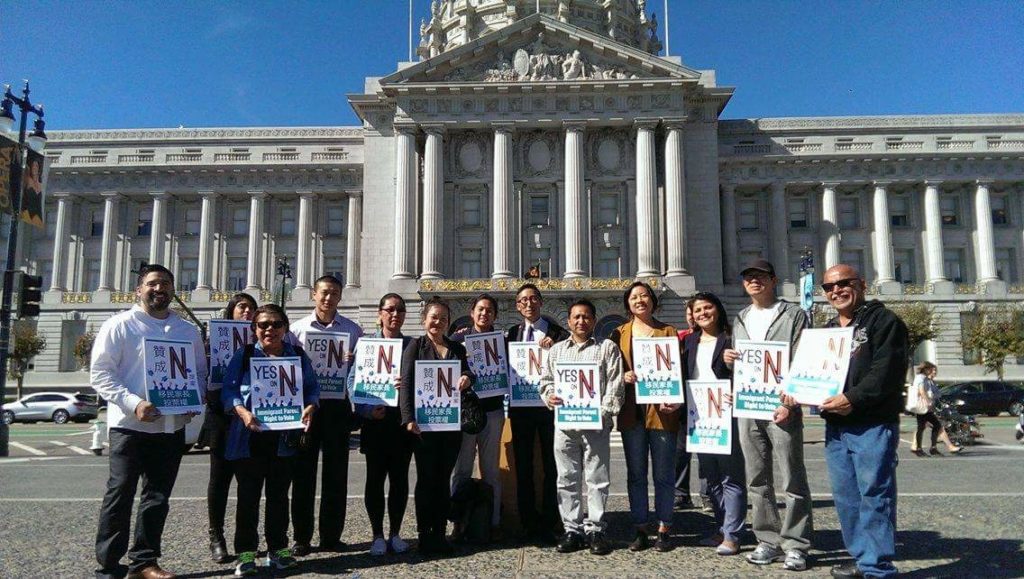
CAA launches Asian Americans for Civil Rights and Equality as a network of grassroots social justice groups working together to create positive change. The network now includes eleven groups: Alliance of South Asians Taking Action, APEX Express, API Equality-Northern California, Asian Prisoner Support Committee, Asian Refugees United, CAA, Hmong Innovating Politics, Hyphen Magazine, the Network on Religion and Justice, VietUnity-East Bay, and the Visibility Project.
Along with nearly a dozen community organizations throughout San Francisco, CAA launches the Language Access Network of San Francisco to improve the accessibility of public services for limited-English proficient residents.
CAA joins partnership with Chinese Progressive Association and City College of San Francisco to train and place former Chinatown restaurant workers into high road hotel and hospitality jobs.
CAA launches the Move City College Forward campaign that rallies 10,000 people to successfully help City College of San Francisco retain its accreditation and avert closing.
With community videos beginning to expose longstanding problems with police violence, CAA joins growing state and national advocacy following the killing of Michael Brown in Ferguson, Missouri.
CAA advocacy in Sacramento launches the State’s One California program that provides legal services to immigrant communities. Locally, CAA co-creates a a rapid response hotline and network to support immigrants facing ICE raids, detentions, and deportations.
In response to rising xenophobia and white nationalism, CAA organizes the Chinese American community to participate in mass rallies and vigils against exclusion and hate in San Francisco Chinatown.
Along with key partners, CAA launches the End National Security Scapegoating Coalition to end racial profiling against all people, and organizes a speaking tour for Professor Xiaoxing Xi who is suing the FBI for wrongful arrest.
CAA helps pass and implement a Proposition N — a groundbreaking Non-Citizen Voting Ordinance that allows all public school parents and guardians to vote in local school board elections.



